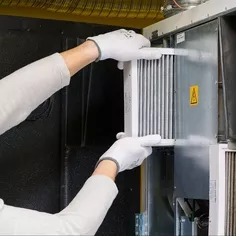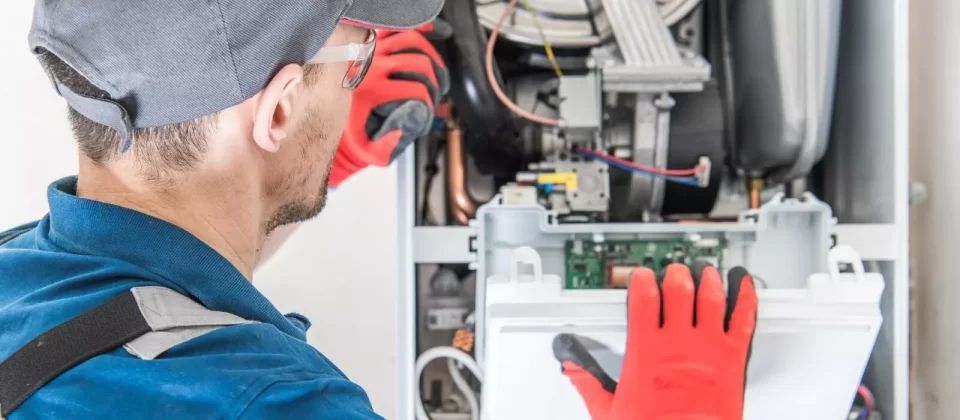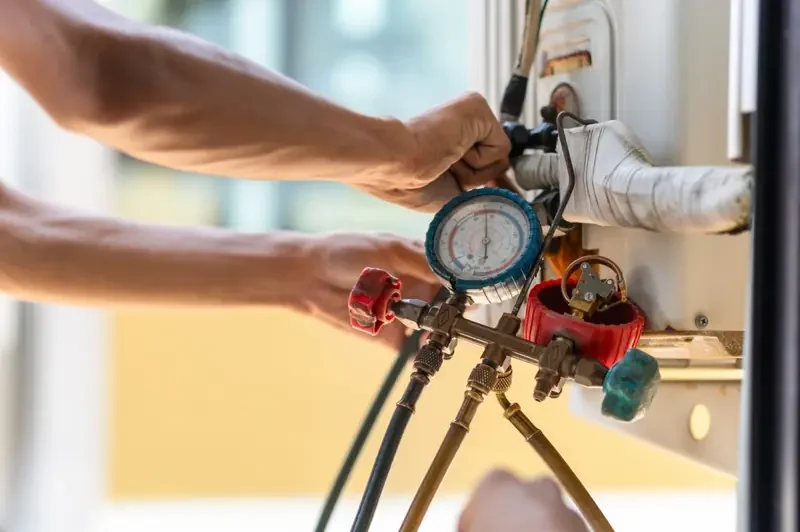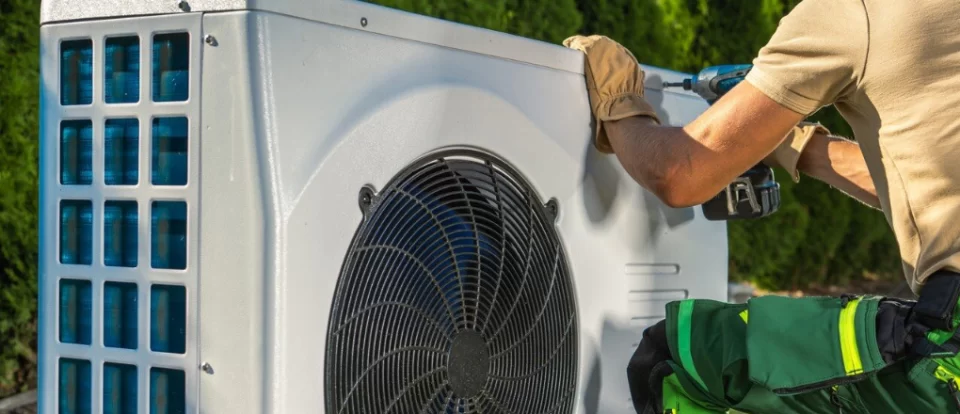A reliable furnace is crucial for keeping your home warm, safe, and comfortable during the coldest months. But as your furnace ages or starts to struggle, you’re faced with a common homeowner’s dilemma: Is it time to invest in a brand new unit, or can you squeeze more life out of your old one with a simple repair?
Given the cost of a full replacement, it’s a question worth considering carefully. While sometimes a quick fix can buy you another season or two, other situations clearly call for a new furnace.
Knowing how to make the right decision can save you money, improve your comfort, and protect your home’s safety.
How Do I Know If My Furnace Needs Replacement?
Furnaces generally last about 15 to 20 years, depending on how well they’re maintained, the quality of the unit, and how heavily they’re used. But age is just one factor. Several key signs can help you decide whether your furnace is ready for replacement:
Age of the Furnace
If your system is 15 years or older, it’s likely losing efficiency—even with regular maintenance. Older furnaces are more prone to sudden breakdowns and usually can’t heat as effectively as they once did. Even if repairs seem minor, you might be putting money into a system that will continue to deteriorate.
Frequent Repairs
Are you calling your HVAC technician every season? Do you find yourself paying for one fix after another? If repair costs are stacking up—especially if they add up to more than half the cost of a new furnace—experts agree it’s time to consider replacement. At a certain point, repairs become a money pit.
Inconsistent Heating
A failing furnace often struggles to maintain a consistent temperature. If some rooms are warm while others are chilly, or if your furnace can’t keep up during a cold snap, the system may be on its last legs. Issues like clogged filters, old blower motors, or worn-out components add up to reduced comfort and higher bills.
Rising Energy Bills
A sudden increase in your heating costs usually signals a drop in furnace efficiency. Older systems need to work harder (and use more energy) to achieve the same results. If you haven’t changed your habits but your bills keep climbing, your furnace could be the culprit.
Unusual Noises
Squealing, rattling, banging, or grinding noises usually indicate failing internal components. While some noises can be fixed, others suggest structural damage or aging parts that are costly to repair and may not solve the root problem.
Before making a final decision, always consult a licensed HVAC professional. They can assess your system, provide an honest opinion, and help you weigh your options.
What are the Signs That Indicate Furnace Replacement is Necessary?
Certain red flags point to the fact that furnace replacement is the wisest—and sometimes the only—choice. Watch for these issues:
Constant Need for Repairs
If you’re regularly paying for repairs, you’re dealing with a furnace on borrowed time. Most breakdowns point to deeper issues, such as a failing heat exchanger, worn blower, or electrical problems that won’t get better with quick fixes.
Increased Dust and Dry Air
Old furnaces can lose their ability to properly filter and humidify your home’s air. If you’ve noticed your home feels dustier, drier, or you see more allergy symptoms, your furnace may be the problem. If a new filter or cleaning doesn’t fix it, replacement may be necessary.
Over 15 Years Old
Even if your furnace still runs, it’s probably less efficient than current models. Today’s furnaces use less energy and provide better heating, so the upfront investment can pay off in lower energy bills and fewer hassles.
Carbon Monoxide Leaks
A yellow or flickering pilot light, headaches, nausea, or a strong odor near the furnace may signal a carbon monoxide leak—a serious safety hazard. If a technician confirms a crack or leak, don’t risk it. Replace the unit immediately.
Struggling to Meet Heating Demands
If your furnace can’t keep up—even when running constantly—your system is likely undersized, worn out, or just too old. Replacing it with a properly sized, high-efficiency model restores comfort and reliability.
When these issues appear, they signal problems that go beyond basic maintenance and point toward replacement as the safest, most cost-effective solution.
How Much Does Furnace Replacement Cost on Average?
Replacing a furnace is a significant investment, but understanding the typical costs helps you plan and budget wisely.
Average Cost
A standard furnace replacement in the U.S. usually costs between $2,500 and $7,500. The total can swing higher or lower depending on several factors.
Main Cost Factors
- Furnace Size: Larger homes need larger (more expensive) furnaces.
- Efficiency Rating: High-efficiency units (90%+ AFUE) are pricier up front but can cut your bills by 30% or more.
- Brand and Features: Well-known brands and models with advanced features (smart thermostats, variable speed fans) add to the cost.
- Installation: Professional installation typically runs $500–$1,500. If ductwork, vents, or electrical systems need updates, the price increases.
Rebates and Incentives
Many utility companies and state programs offer rebates for installing high-efficiency systems, which can help offset the higher upfront cost.
Long-Term Savings
New furnaces are far more efficient than those built 15–20 years ago. While replacement is an investment, the savings on energy and repair costs quickly add up over the next decade.
Can a Furnace Repair Be a Better Option Than Replacing It?
Not every furnace problem calls for a full replacement. Sometimes, a repair is all you need—especially if your unit is under 10 years old and the issue is minor.
When Repair Makes Sense
- The problem is a single, easily replaceable part (like a thermostat, igniter, or capacitor).
- Your furnace is less than 10–12 years old and has a good service history.
- The repair costs less than half the price of a new system.
When Replacement Is Wiser
- Repairs are becoming frequent or expensive.
- The unit is older than 15 years.
- The furnace is inefficient and drives up your utility bills.
- Safety is a concern, such as a cracked heat exchanger.
Ask your HVAC professional for a cost comparison. If a repair buys you only a year or two of service, replacement may save you money and trouble in the long run.
Making the Right Decision for Your Home
The choice between repairing or replacing your furnace depends on age, efficiency, safety, and your budget. An honest assessment from a trusted HVAC technician is your best guide. When in doubt, prioritize your family’s comfort, health, and long-term savings.
If your furnace is showing its age, breaking down repeatedly, or pushing your bills higher, it’s probably time to invest in a new, efficient system. You’ll gain peace of mind, lower energy costs, and a warm home—no matter how cold it gets outside.
Take Control of Your Home’s Comfort with Elite Air & Heat LLC
At Elite Air & Heat LLC, we’re committed to keeping your home comfortable all year long. Whether you need expert advice, routine maintenance, emergency repairs, or a full furnace replacement, our team delivers high-quality service and honest recommendations.
Contact us today to schedule a consultation and discover how easy it can be to stay warm, safe, and energy efficient this winter—and every season that follows.





